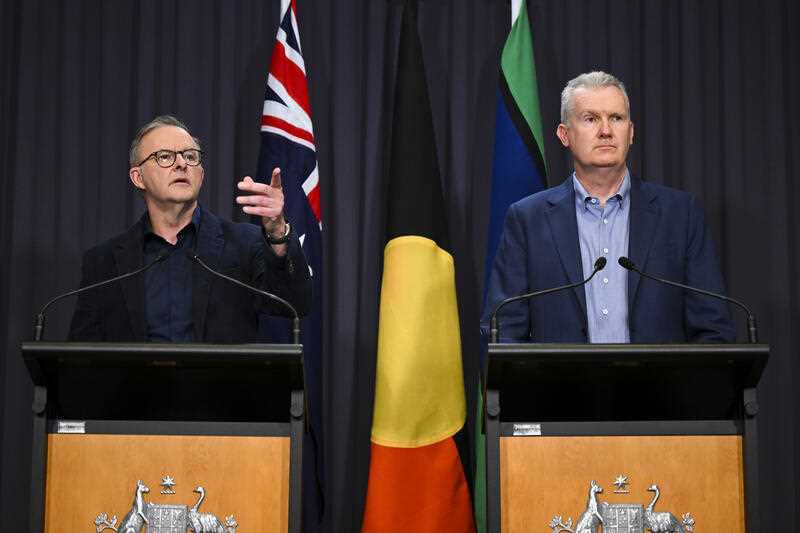Working people will be the big winners of a deal that paves the way for Labor’s signature industrial relations laws to pass parliament, the prime minister says.
Following late-night negotiations on Saturday, Senator David Pocock agreed to back the workplace legislation overhaul and enshrine multi-employer bargaining.
Prime Minister Anthony Albanese said support for the bill meant stagnant wages should rise.
“Today is a huge day for working people, and the decision by the crossbenchers to back Labor’s bill – which will guarantee more-secure work and better pay – is the right one,” he told reporters in Canberra on Sunday.
“The (industrial relations) bill will ensure that there’s a more level playing field.”
Labor has been pushing for the laws to be passed before the end of the year despite only one sitting week remaining.
Under agreed changes to the legislation, the government will set up an independent body to review social support payments before every federal budget.
Small businesses with fewer than 20 employees will be excluded from single-interest multi-enterprise bargaining.
Businesses with fewer than 50 employees will have extra safeguards if they want to opt out of multi-employer bargaining, while the minimum bargaining period will also be increased from six to nine months.
Senator Pocock said the bill was rushed but the changes were a good step forward.
“This is a great outcome and really strikes the right balance to get wages moving for those who need it but also to have some really important safeguards in place, particularly for small businesses,” he said.
Mr Albanese said having an independent committee to examine social payments would be a vital process.
“I would always want to do more for people who are disadvantaged,” he said.
“We don’t like seeing circumstances whereby people are doing it tough, but what we know is that we need to be responsible.”
Opposition workplace relations spokeswoman Michaelia Cash said she was disappointed a deal had been struck on the bill, warning businesses would be unfairly affected by the changes.
“This bill will have a detrimental impact on the Australian economy … I’m disappointed on behalf of the employers of this country, I’m disappointed on behalf of employees of this country,” she said.
Greens employment spokeswoman Barbara Pocock said the government needed to take action on lifting welfare payments.
“We don’t need committees, we need to make sure it actually happens,” she said.
Business groups maintained their criticism of the bill, saying the agreed changes didn’t go far enough to alleviate concerns.
Australian Chamber of Commerce and Industry chief executive Andrew McKellar said the laws would not lead to increased wages.
“(They) will only add cost and complexity to Australian businesses at a time when they are dealing with deteriorating conditions,” he said.
But ACTU secretary Sally McManus welcomed a deal being struck that allowed the bill to pass.
“It gives people hope that we can start unwinding the large numbers of insecure jobs that we have in this country,” she said.
Workplace Relations Minister Tony Burke said the negotiations had been an intense process.
“(Senator Pocock) would have preferred that everything was dealt with next year, when we said we wanted to make decisions this year,” he told ABC’s Insiders program.
The minister said it was likely the lower house would have to sit on Saturday to pass the laws when they cleared the Senate later this week.
By Andrew Brown in CANBERRA



